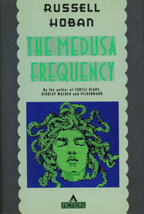
At three o'clock in the morning Eurydice is bound to come into it.
—The Medusa Frequency, (p. 9)

Herman Orff is a freelance comic writer and not-exactly-successful novelist in search of inspiration for his difficult and elusive third novel. What he finds instead are The Kraken, a rather needy (and hilariously innocent) presence who represents a kind of unconscious terror that communicates with Orff via green phosphorous block capitals on his computer screen; Melanie Falsepercy, a comely lass who seems to represent a possible means of escape, or at least diversion from Orff's past; Istvan Fallok, a  musician and tinkerer who hooks Orff up to an experimental EEG-type machine in hopes of stimulating his brain; and, as a result of that experiment, the Head of Orpheus, which appears to Orff in all sorts of unlikely places, and insists on recounting the story of how he lost Eurydice forever. What Orff can't seem to find are his old flame Luise, a woman who embodies the perpetual lostness of Eurydice; and his own lost inspiration, as Orpheus's tale and Orff's own gradually become intertwined in a heady and poetically potent blend of mythological riffing and daft comedy.
musician and tinkerer who hooks Orff up to an experimental EEG-type machine in hopes of stimulating his brain; and, as a result of that experiment, the Head of Orpheus, which appears to Orff in all sorts of unlikely places, and insists on recounting the story of how he lost Eurydice forever. What Orff can't seem to find are his old flame Luise, a woman who embodies the perpetual lostness of Eurydice; and his own lost inspiration, as Orpheus's tale and Orff's own gradually become intertwined in a heady and poetically potent blend of mythological riffing and daft comedy.
I think the San Francisco Chronicle review, cited below, gets it exactly right by calling this book "mytho-comedic," and praising its union of the sublime and the ridiculous. My synopsis of the plot, above, isn't very long, compared to some of the others on this site: that's because this book really isn't about plot, it's about ideas, comedy, poetry, the deep interplay of archetypal patterns, blighter's rock and the terror of being. It's about the writing, some of the very best Mr. Hoban has ever done. It's about Eurydice, old lovers and three a.m., inspiration and loss, and reading it is about the journey rather than the destination. This may explain why some fans of Mr. Hoban's more plot-driven books, like Riddley Walker, can sometimes be slower to warm up to the Medusa Frequency. But for those of us who read a book not to get to the end of it, but rather to savor its humor, wisdom, eloquence and insight, The Medusa Frequency is a priceless treasure. The sort of book that may take a little concentration to get through the first time, but after that never manages to sit on your bookshelf long enough to acquire a respectable film of dust before you pull it down to re-read passages at random, or look up a particular line or incident that's stuck in your mind.
"Russell Hoban has proven himself a wordsmith and a punster on a par with Lewis Carroll and James Joyce...His restless, ranging imagination has succeeded in creating a mythic grandeur in the haunting head of Orpheus, and a lyric beauty in the fateful rendition of his tale."
--New York Newsday
"Ingenious...As reflective and paradoxical as a hall of mirrors, no doubt about it. And if you think novels should be about parents and kids and marriage and war and growing up, you'll probably hate it. Which is too bad, because Hoban's Medusa's Frequency doesn't just blip for miserable scribblers. It blips for thee."
--The Village Voice Literary Supplement
"The always adventurous and unpredictable Russell Hoban--whose works range from the gentle Turtle Diary to the post-apocolyptic Riddley Walkernow waxes mytho-comedic...The sublime and the ridiculous meet in a novel that is wise, funny and inspiring."
--The San Francisco Chronicle Book Review
"There's a sense of wonder in these passages...a love of fantasy and myth-making, an interest in language and puns, and a concern with philosophic speculation and the pyrotechnics of storytelling."
--The New York Times
"Russell Hoban's The Medusa Frequency is the sort of hyper-kinetic feat of the imagination that runs on high octane fuel and thunders across its surreal landscape at a dangerously high speed...in the course of this tour through the imaginative outback of Mr. Hoban's mind, we are treated to brilliant flashes of mordant humour, not to mention splendidly baroque evocations of present day London."
--The Listener
"The Medusa Frequency sparkles with classical allusions and a wisecracking American humour at times suggesting the Marx Brothers."
--The Daily Telegraph
"Short, smart and fizzy, the novel seeks out the roots of creativity with none of the solemnity that phrase implies."
--New Statesman

Back to The Head of Orpheus: a Russell Hoban Reference Page (home page).
Russell Hoban's other novels and collections: